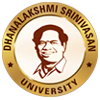Admission Enquiry Form
for UG/PG : admissions@dsuniversity.ac.in , for Ph.D : admissions.research@dsuniversity.ac.in
Helpline : +91 63841 76766 | 63841 76769


Admission Enquiry Form
for UG/PG : admissions@dsuniversity.ac.in , for Ph.D : admissions.research@dsuniversity.ac.in
Helpline : +91 63841 76766 | 63841 76769
DST-SERB Sponsored National Seminar on Millets on 13th & 14th Oct - 2023 titled “Exploring The Global Potential of Millets: Food Security, Health & Sustainability” at DSU - 13th and 14th October 2023
The School of Agricultural Sciences at Dhanalakshmi Srinivasan University, Trichy, hosted a two-day national seminar, sponsored by DST-SERB, centered around the theme of "Exploring The Global Potential Of Millets: Food Security, Health & Sustainability." The inaugural session took place on the 13th of October 2023, commencing at 9:30 AM in Lecture Theatre 1 of the Academic Block at DSU.The event featured a distinguished panel of guests, including Dr. CK Ranjan, the Vice-Chancellor of DSU; Dr. M. Ravichandran, Registrar (i/c) and Dean of the School of Agricultural Sciences; and Dr. G. Ranganathan, former Professor and Head of Agricultural Extension at TNAU, as well as an advisor to Dhanalakshmi Srinivasan Agricultural College, Perambalur. The Chief Guest for the seminar was Dr. AL Narayanan, a renowned Professor of Agronomy at the Pandit Jawaharlal Nehru College of Agriculture and Research Institute, Karaikal. In addition, Deans and Associate Deans from various academic departments graced the inaugural session.
The proceedings commenced with the rendition of the Tamil Thai Vaalthu, a traditional Tamil invocation. Dr. Pathma J, Associate Professor of Entomology and the seminar's convener, extended a warm welcome to the gathering. Following this, the dignitaries ceremoniously lit the lamp. Dr. CK Ranjan, the Vice-Chancellor, honored the Chief Guest, Dr. AL Narayanan, the Guest of Honor, Dr. G. Ranganathan, and the resource persons participating in the seminar. Dr. CK Ranjan also unveiled the book of abstracts, which contained research findings related to millet cultivation and value addition, presented by scientists, research scholars, and both undergraduate and postgraduate students from various regions of the country.
Dr. M. Ravichandran, the Dean of the School of Agricultural Sciences, delivered the presidential address, while Dr. G. Ranganathan, the Guest of Honor, offered his felicitations. Dr. AL Narayanan, in his Inaugural address, emphasized the transformation of millets from being once perceived as minor crops for food and nutritional security to now being recognized as major contributors to sustainability. He congratulated the organizing committee for selecting such a pertinent theme, especially during the International Year of Millets in 2023.
During the first day of the seminar, several informative sessions were conducted:
1. Dr. AL. Narayanan, Professor of Agronomy at PAJANCOA &RI, Karaikal, India, delivered a lecture titled "Unlocking Potential: Exploring the System of Ragi Intensification (Srgi) for Sustainable Agriculture."
2. Dr. K.A. Athmaselvi, Associate Professor and Head of the Centre of Excellence for Grain Sciences at the National Institute of Food Technology, Entrepreneurship, and Management (NIFTEM) in Thanjavur, India, gave an invited lecture on "Millet Processing and Value Addition."
3. Dr. J. Diraviam, Senior Scientist and Head of KVK in Karur, Tamil Nadu, India, presented a lecture on "Biotic Stress Management in Millets."
4. Dr. Malathi, SMS in Home Science at KVK, Karur, Tamil Nadu, India, discussed "Natural Nutraceutical Properties of Ancient Grains for Modern Health - Millets."
5. Dr. N. D. Shrinithivihahshini, Associate Professor and Head of the Department of Environmental Science and Management at Bharathidasan University, Tiruchirappalli, India, spoke on the topic of "Role of Millets in Climate-Resilient Agriculture."
6. Dr. Sangappa, a Scientist in Agricultural Extension at the Indian Institute of Millets Research in Hyderabad, Telangana, India, delivered a lecture online on "Cultivating Change: Igniting Millet Demand in Non-Millet Regions through Innovative Extension, Research & Training," concluding Session 2 after lunch.
On October 14th, the second day of the seminar featured the following activities:
1. The day commenced at 9:00 AM with a session of oral presentations by researchers, with six of them presenting their research findings.
2. Dr. J Stanley, a Senior Scientist at the Indian Institute of Millets Research (IIMR) in Hyderabad, Telangana, delivered an invited lecture on "Millets for Nutritional Security."
3. Mr. K. Suresh Kumar, CEO of Mithraa Millets, Trichy, gave an invited lecture on "Innovative Agripreneurship in the Food Industry Using Millets."
4. The session continued with the second slot of oral presentations, featuring seven more participants presenting their research.
5. Dr. Mathimaran Natarajan, Centre Head & Coordinator at the Centre for Sustainability and Climate Studies, Department of Ecology and Environmental Sciences, and Deputy Dean (International Relations) at Pondicherry University, Puducherry, provided an invited lecture on "Bio-irrigation-based Legume-Cereal Sustainable Farming System in the Era of Climate Change."
6. Another invited lecture, "Trends of Millets Production and Consumption in India - An Overview," was presented by Dr. T. Sivasakthi Devi, Assistant Professor in Economics at PAJANCOA &RI, Karaikal, India.
7. The third slot of oral presentations followed these lectures.
8. After lunch, Dr. Nirmalakumari A, a former professor in Plant Breeding at Tamil Nadu Agricultural University, presented on "Preserving the Past, Cultivating the Future: Exploring Millet Breeding, Genetic Diversity, Conservation," followed by the fourth slot of oral presentations.
In total, 29 oral presentations and 22 posters were presented, and they were evaluated by a panel of three judges.
In an effort to promote millet cultivation and showcase the delightful taste and health benefits of millets, the event organizers treated participants to millet-based meals over both days of the seminar.On the first day, the morning refreshments included multigrain Laddu and a nourishing Moringa (Moringa oleifera) soup. For lunch, attendees were treated to a delectable menu featuring dishes crafted from various types of millets. This included Halwa and Tamarind rice made from Thenai (Fox tail millet - Setariaitalica), sambar millet rice prepared with Samai (little millet - Panicum sumatrense), and curd millet rice made from Kuthiraivazhi (Barnyard millet - Echinochloafrumentacea).
On the second day, the morning refreshments consisted of thuthuvelai (Solanum procumbens) herbal soup, and the lunch menu boasted a delightful spread. This included halwa made from Ragi (finger millet - Eleusine coracana), Samai (little millet - P. sumatrense) biryani, and varagu (Kodo millet - Paspalum scrobiculatum) curd millet rice.
The herbal soups were generously sponsored by Mitraa Millets, who also showcased a variety of millet-based instant mixes, including porridge mix, dosa mix, Pongal mix, millet pasta, and millet noodles, among others. These offerings left participants thoroughly impressed and helped dispel any misconceptions that millet-based foods lack in taste.
The seminar concluded with a valedictory session that commenced with Dr. R. Kamaraj Kennedy, Assistant Professor and co-convener, extending a warm welcome to the audience.
Dr. M. Ravichandran, Dean of the School of Agricultural Sciences, and the Registrar in charge of Dhanalakshmi Srinivasan University, delivered the presidential address. He expressed his appreciation and congratulated the organizers and participants for their contributions to the seminar's success.
Dr. Mathimaran Natarajan, the Centre Head & Coordinator of the Centre for Sustainability and Climate Studies at Pondicherry University, Puducherry, presented the valedictory address. He emphasized the seminar's significance in providing a platform for researchers from across the country to share their knowledge and innovations, ultimately enhancing millet cultivation and consumption.
Following the addresses, a prize distribution ceremony took place. The top three oral and poster presentations were recognized. The first, second, and third places for oral presentations were awarded to Dr. J. Bhuvaneswari, Assistant Professor at VOC Agricultural College & Research Institute, TNAU, Killikulm; S. Sowmiya, Research Scholar at VOC Agricultural College & Research Institute, TNAU, Killikulm; and Sri Raj Haran RS, a B.Sc. (Hons) Agriculture student at the School of Agricultural Sciences, Dhanalakshmi Srinivasan University, Trichy, respectively. The first and second place for the poster presentation was secured by Janani. K and Vijayalakshmi. R respectively from the Department of Food Service Management and Dietetics at Cauvery College for Women (Autonomous), Trichy. The third place was shared by Reecha J, a Ph.D. Scholar in the Department of Plant Pathology at Sardar Vallabhbhai Patel University of Agriculture and Technology, Meerut and Sathish Palanisamy, a Research Scholar at Dhanalakshmi Srinivasan University, Samayapuram, Trichy.
The seminar convener, Dr. Pathma J, an Associate Professor of Entomology at the School of Agricultural Sciences, Dhanalakshmi Srinivasan University, provided a concise summary of the two-day proceedings and delivered the vote of thanks. The program concluded with the national anthem.
In conclusion, by serving as a pivotal avenue for the promotion of millet cultivation, this seminar becomes an instrumental driver aligning with the United Nations Sustainable Development Goals (SDGs). Millet cultivation is a versatile pathway towards achieving several of these vital SDGs:
1. Zero Hunger (SDG 2): Millets, being nutrient-rich and drought-resistant crops, emerge as a crucial pillar in ensuring food security, particularly in regions with challenging agricultural conditions.
2. Good Health and Well-being (SDG 3): The nutritional bounty of millets fosters dietary diversity and improved health, underpinning progress toward this goal.
3. Clean Water and Sanitation (SDG 6): Millet cultivation, with its minimal water requirements, not only mitigates water consumption but also aligns with the principles of sustainable water management.
4. Climate Action (SDG 13): Millets, as climate-resilient crops that demand minimal inputs and endure harsh environmental conditions, form an integral facet of climate-smart agriculture, facilitating climate action.
5. Life on Land (SDG 15): Millet cultivation positively influences soil fertility and champions sustainable land management practices, combating land degradation and preserving terrestrial ecosystems.
6. Partnerships for the Goals (SDG 17): The indispensable nature of collaborative efforts between governments, NGOs, farmers, and researchers in promoting millet cultivation highlights its value in adhering to the cooperative spirit of SDG 17.
By incorporating millet cultivation practices and advocating for increased consumption, we actively contribute to the realization of these United Nations Sustainable Development Goals, thereby forging a path toward a more sustainable, equitable, and prosperous future.